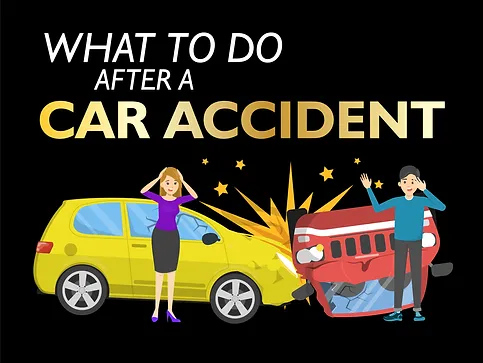Car accidents happen a lot in the state of Florida. In fact, there’s been about 30,107 accidents just this year in Florida according to the Florida Department of Safety and Motor Vehicles.
We here at Demesmin and Dover Law Firm want to help reduce the amount of accidents in Florida by providing people with knowledge about accidents. We do this because we know the impact that a car accident can have on a person’s life. That is why in this article, we outlined some crucial steps for you to take to protect yourself and your legal rights.
7 Important Steps to Take After a Car Crash
Here are some key things you should take into account after an accident.
Step 1: Ensure your safety
The priority after a car accident is to ensure your safety and the safety of anyone else involved in the accident. If anyone is injured, call 911 immediately for medical assistance.
Step 2: Exchange information
Exchange contact and insurance information with the other person(s) in the accident. Be sure to obtain the other driver’s name, phone number, license plate number, driver’s license number, and insurance information.
Also, try to obtain contact information from any witnesses who saw the car accident.
Step 3: Document the scene
Take photos of the accident scene, including damage to the vehicles in the accident, skid marks, and any other pertinent details. This will help provide evidence and support your claim. Take images from all angles of the car to show what condition it is in and where the damages are.
These images should not be posted on social media, they are for the use of your car accident attorney and your insurance company. Any information you have can help establish fault and identify who the at-fault driver is when trying to find who should be held liable after the accident.
Step 4: Report the accident
In Florida, if the accident results in injuries, death, or property damage, you are required to report the accident to law enforcement. You can do this by calling the local police department or Florida Highway Patrol. It is crucial to obtain a police report, as it can be used as evidence in your case.
Step 5: Seek Medical Attention
Even if you don’t feel injured, it is essential to seek medical attention after a car accident. Some injuries may not show symptoms immediately, and it is important to document any injuries and seek treatment promptly.
Step 6: Contact an Attorney
After a car accident, it is important to contact an experienced car accident attorney to help protect your legal rights. An attorney can help you navigate the complexities of insurance claims, medical bills, and legal proceedings.
You should also contact your insurance company immediately following your conversation with your attorney to report the accident.
Step 7: Avoid discussing the accident
Avoid discussing the car accident with anyone other than your attorney, as anything you say could be used against you in a legal dispute.
In taking these steps, you can help protect your safety and legal rights. Remember to prioritize safety, document the scene, report the accident, seek medical attention, and contact an experienced attorney. At Demesmin and Dover Law Firm, we are here to help guide you through the process and fight for your legal rights.
The most common types of car accidents
Accidents can be very dangerous. They can cause very serious injuries or sometimes even result in death. That is why it is so important to stay vigilant so that you can drive your cars safely from point A to point B.
We believe the more that you know about a car accident, the better you will be at protecting yourself from getting into one. Here are some of the most common accidents that occur in the state of Florida:
A rear-end collision:
This occurs when one car crashes into the back of another vehicle. Rear-end collisions can happen when a car is following too closely or is distracted and does not brake in time.
These accidents typically put the car in the back at fault, but occasionally there are circumstances in which the front car is held responsible for the car accident.A side-impact collision:
This type of accident is also referred to as a T-Bone accident, it occurs when the front of one car collides with the side of another car. Side-impact collisions are often the result of a car running a red light or stop sign.A head-on collision:
This occurs when the front of one vehicle crashes into the front of another vehicle. Head-on collisions can be particularly dangerous and often result in serious injuries or fatalities.Rollover accident:
This occurs when a car flips over onto its roof or side. Rollover accidents can be caused by a variety of factors, including speeding, swerving, or driving on a slippery surface.Single-car accident:
This occurs when a car collides with a stationary object, such as a tree or utility pole. Single-car accidents can be caused by driver error, such as speeding or distracted driving.Multi-car pileup:
This occurs when multiple vehicles are involved in a chain-reaction collision. Multi-car pileups can happen on highways and are often caused by poor weather conditions, such as fog or heavy rain.Hit-and-run accident:
This occurs when a driver hits another car or pedestrian and then leaves the scene without stopping. Hit-and-run accidents can be particularly frustrating for victims, as they may have difficulty identifying the responsible driver.
An experienced car accident attorney can help you understand your legal rights and pursue compensation for your injuries and other losses.
The 5-steps to take when you hire a car accident lawyer
If you’ve been in a car accident and are considering hiring a to help you with your case, it’s important to understand what working with an attorney entails. Here are 5-step to follow when you hire a car accident lawyer:
Initial consultation:
The first step is to schedule your free consultation with a car accident attorney. During this meeting, the attorney will review the details of your case, ask you questions about the car accident, and explain your legal rights and options.Investigation:
Once you have hired an attorney, they will begin to investigate your case. This may involve gathering police reports, medical records, and witness statements, as well as reviewing any available video footage or photographs of the car crash.Negotiation:
Once the attorney has a full understanding of the facts of your case, they will begin to negotiate with the insurance company or other driver. The goal of negotiation is to reach a settlement agreement that is fair and reasonable for you.
It is important to note that your car insurance company covers the first 10,000 of your medical bills after a car accident due to your required personal injury protection coverage.
Your insurance policy also gives you the option that before fault is established, you can pay a copay to have your insurance handle the property damage claim until then. Once fault is established, all payments will go through the car insurance of the at-fault driver.Litigation:
If negotiation does not result in a satisfactory settlement, your attorney may advise you to file a lawsuit against the insurance company. In this case, your attorney will represent you in court and will work to secure a favorable outcome for you.Settlement or verdict:
If your attorney is successful in negotiating a settlement or winning a verdict in court, you will receive compensation for your injuries and other losses (pain and suffering, lost wages, emotional damages, etc.) The amount of compensation will depend on the specific facts of your case, but may include reimbursement for medical expenses, lost wages, and pain and suffering.
How big is the loss of a person? You can be reimbursed for your injuries, pain and suffering, and damages to your house. Several things can affect your money.
When you are involved in a car accident and suffer injuries, you may be entitled to compensation for your losses. However, determining the amount of compensation can be complex. Here are some factors that are considered when compensation is determined for car accident injuries:
Medical expenses: The cost of medical treatment, including hospital visits, surgery, medication, and physical therapy, is one of the most significant factors in determining compensation. Your attorney will work to ensure that all of your expenses are taken into account when determining compensation.
Lost income: If your injuries prevent you from working, you may be entitled to compensation for lost income. This includes both wages and any benefits you would have received, such as vacation time or bonuses.
Pain and suffering: In addition to economic damages, you may be entitled to compensation for non-economic damages such as pain and suffering. This can include physical pain, emotional distress, and loss of enjoyment of life.
Future expenses: If your injuries require ongoing medical treatment, you may be entitled to compensation for future medical needs. Your attorney will work with medical experts to estimate the costs of your future medical care.
Property damage: If your car was damaged in the accident, you may be entitled to compensation for the cost of repairs or replacement.
Comparative negligence: In some cases, both drivers may be partially responsible for the accident. In these cases, the amount of compensation you receive may be reduced based on your percentage of fault for the accident.
Insurance limits: The amount of compensation you can receive may be limited by the insurance policy limits of the at-fault driver.
What a Car Accident Lawyer Can Do for Your Case
A personal injury attorney is a professional in car crash litigation specializing in car injuries involving a personal injury claim or an injury lawsuit. You may have a variety of choices to pursue your compensation. List the most important actions that an accident lawyer will perform when dealing with a person injured in a motor vehicle accident.



